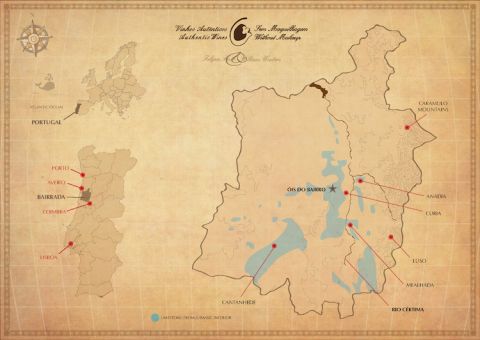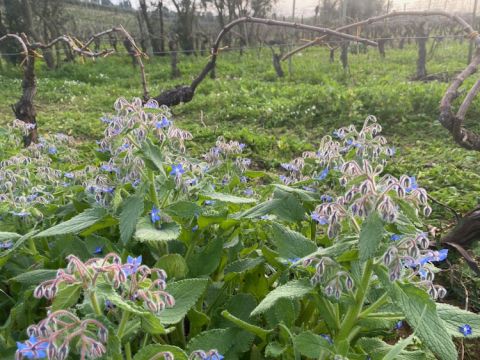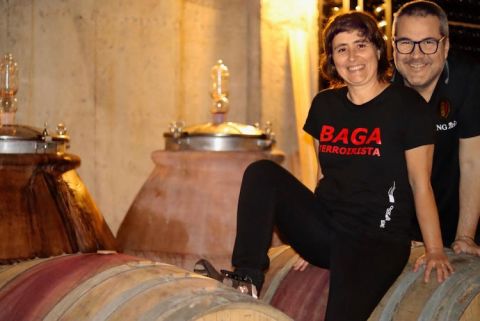From €9.50, $15.99, £16, 189.90 Norwegian kroner, 146.90 Brazilian reais
DNMC isn’t really an abbreviation but it stands for ‘Dinâmica’, which does not exactly appear on the label (see above) because it could not be registered as an international brand. It’s a good name for this delicious and easy-drinking red, from a small but cool vintage, that cleverly shows the characteristics of the dark-skinned grape variety Baga and its home of Bairrada, influenced so clearly by proximity to the Atlantic coast of Portugal, as shown in their map below.
I say clever because, as explained in Baga strikes back and Exploring Bairrada, befriending Baga, Baga is a typically high-tannin and high-acid variety that requires great skill and experience from growers and winemakers alike, as well as co-operation from the weather. Clever because it is a serious wine at a very good price that is just ready and waiting to be drunk.
Here’s my rather long tasting note, including a GV for good value:
‘Deep purplish crimson, relatively dark for Baga. Extremely pure red and dark-red fruits with a sprinkling of stone dust. When I first opened it there was something slightly savoury but this seemed to disappear with aeration to leave beautiful vibrant fruit, pure and without obvious sweetness and eventually a delicate, very slight floral quality in the same way that northern Rhône Syrah can be floral (though there the similarity ends). The aromas are matched on the palate and the fruit is full of lively, intense freshness. Complex range of fruit flavours without the need for oak, so scented, gently herbal/stony but not in the least green, and even more fragrant on the day after opening. Fully ripe at such a moderate alcohol level. Lovely example of unoaked Baga. Very fine, very dry tannins (I wouldn't call them 'soft' but I suppose they are relatively soft for Baga), chalky rather than grainy, and then a long aftertaste of zesty red fruit. Mouth-watering and moreish. GV’
William Wouters, one half of the partnership behind this wine, explains why they chose this name: ‘the idea behind the name of Dinâmica is to show that Bairrada still has a very present polycultural environment (olive trees, fig trees, pine trees, etc) which attracts lots of wild animals and auxiliary insects that protect the vines from diseases’. They also see their own dynamic role in guiding nature to protect and preserve this polyculture, for example by avoiding as far as possible the use of heavy machinery in the vineyards that would compact the soils or disturb the natural balance. Pato’s slogan has long been vinhos autênticos sem maquilhagem, ‘authentic wines without make-up’.
Wife and husband Filipa Pato and William Wouters (below) make it clear on their website and labels that this is very much a shared life with joint responsibility: in the vineyard, in the winery, and, most importantly, in the home they share with their two teenage sons. Pato graduated in chemical engineering from the University of Coimbra, then worked harvests in Bordeaux, Mendoza and Margaret River as well as with her father Luís Pato in her home region of Bairrada. She produced her first wines under her own label in 2001 so they are planning some 20th-anniversary celebrations later this year.
Wouters, from a family of restaurateurs in Antwerp, is a chef, champion sommelier and restaurateur and former head chef of the Belgian national soccer team for the World Cup in Brazil and the European Cup in France.
The grapes for this wine come from vineyards that are farmed biodynamically even if not all of them are yet certified. They own some and rent others and are very keen to support workers in their local community. There’s a mix of bush vines and trellised plants with an average age of 40 years. The younger vines have been propagated by mass selection from the old vines in an effort to maintain diversity and select the best plant material available. They believe that biodynamic farming promotes even ripening of the grapes and that this, combined with careful selection of the fruit, gentle extraction and low sulphur dioxide additions (total SO2 is 29 mg/l), allows them to make this style of wine from this grape variety.
Pato writes: ‘Each location has its own expression of Baga. This for us is a real terroir-driven wine and a nice example of Baga with a fruity character and soft tannins. Every plot is vinified apart and at the end we assemble all of them into one balanced unique cuvée.’
Fermentation is in stainless-steel tanks, with four weeks on the skins. The wine stays in the tanks until April, and there’s no oak influence at all for what they describe as their ‘everyday, easy-drinking red’. Total production is 22,000 bottles. Definitely very little make-up applied here.
I asked Wouters for some background on the 2019 growing season since this variety is so sensitive to vintage conditions:
‘2019 was very special, it was one of the coolest vintages ever in Bairrada. Climate change really exists. The winter was not very wet and cold; spring, on the other hand, we recuperated enormously. During almost two weeks we had 2–3 days of rain. This helped us to keep our philosophy of “dry farming” [no irrigation] even for the new plantations: nature turns out to be an excellent partner. Some vineyards were attacked by frost – we haven’t experienced this for a long time. We had another confirmation of the wisdom of our ancestors: the olive trees, fig trees, pine trees, etc that are planted in the vineyards (really typical for Bairrada), protected almost all the other vineyards against the frost.
‘The maturation of the grapes was very slow but extremely balanced in 2019. This mainly because of the cooler temperatures and the regular rain showers in the spring. After 21 June the summer arrived, paradoxically, very dry but never really very hot. This weather continued till 4 September, when temperatures finally hit 30 °C [86 °F] and a little bit more. The Baga harvest started around 12 September after some light local rains cooled off the vineyards and strong winds dried the grapes. Thanks to the weather forecast we could perfectly plan the harvest. There was no need for triage because of the excellent quality of the grapes. In fact the Baga bunches were smaller than usual, but in a perfect state of health although the crop was smaller.
‘2019 will go in our history as a very aromatic vintage with a lot of structure, intense colour – even if we didn’t extract much. This vintage – for us – is one of the best until now.’
As Wouters concludes, ‘Our aim is to take the lead in making Bairrada popular again (#bagaterroirista).’
Baga from Bairrada has been on my list of favourites for a long time but I hope this wine, like my Vadio wine of the week nearly two years ago, will enlarge the circle of Baga friends.
Dinâmica is most widely available in Portugal and the US but also in the UK (imported by Clark Foyster though I came across it thanks to Portuguese restaurant Bar Douro, now in two London locations; Exel Wines will have stock next week), Denmark, Germany, Belgium and Brazil. See the Wine-Searcher link at the top of the article.
There's plenty more coverage of Bairrada, and Baga, on Purple Pages.
















